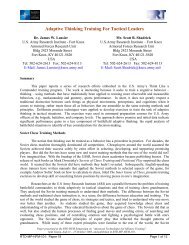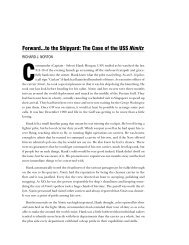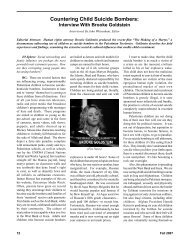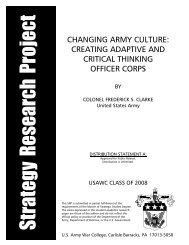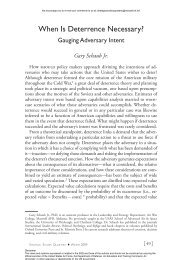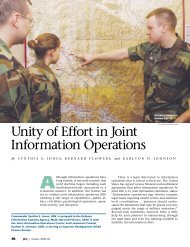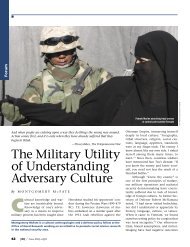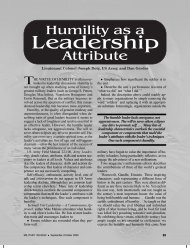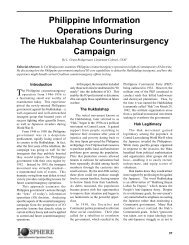Socioeconomic Roots of Middle East Radicalism
Socioeconomic Roots of Middle East Radicalism
Socioeconomic Roots of Middle East Radicalism
Create successful ePaper yourself
Turn your PDF publications into a flip-book with our unique Google optimized e-Paper software.
32 NAVAL WAR COLLEGE REVIEW<br />
economic determinism is implied here. To understand how and why discontent<br />
spawned by unemployment takes a specific political and ideological form, we<br />
cannot rely alone on demography and economics. We must also look at political<br />
structures and ideological environments.<br />
The Ayatollah Khomeini is reported to have said, “The revolution is about Islam,<br />
not the price <strong>of</strong> melons.” Deeper issues <strong>of</strong> identity and legitimacy are at stake.<br />
For example, it should be remembered that although unemployed, frustrated<br />
young men can turn to Islamism, they can also turn to drugs and crime, to apathy,<br />
indifference, muddling through, dogged hard work, or any number <strong>of</strong> other<br />
personal “coping” strategies. The decision to join a revolutionary movement is<br />
an idiosyncratic and deeply personal one. <strong>Socioeconomic</strong> contexts may be important<br />
for understanding these movements, but they hardly provide a complete<br />
explanation for them. Nevertheless, the huge numbers <strong>of</strong> discontented young<br />
men and women are a major threat to the internal stability <strong>of</strong> the <strong>Middle</strong> <strong>East</strong>.<br />
Youth politics always and everywhere focuses not merely on material goods<br />
but also on questions <strong>of</strong> identity, justice, and morality. Consider, for example,<br />
the politics <strong>of</strong> the American “baby boomers” <strong>of</strong> the 1960s. Impatience and<br />
Manichean thinking are among the burdens <strong>of</strong> youth politics, whether in Berkeley<br />
or Cairo. Also, as criminologists point out, resort to violence is overwhelmingly<br />
a phenomenon <strong>of</strong> youth. The millions <strong>of</strong> unemployed and underemployed<br />
young men gathered in the specific political and cultural milieux <strong>of</strong> the region<br />
constitute one <strong>of</strong> the tangled roots <strong>of</strong> radicalism.<br />
THE JUNGLE OF THE CITIES<br />
The discontent <strong>of</strong> these young people is exacerbated by the fact that most <strong>of</strong><br />
them now live in cities—cities that are crumbling. The number <strong>of</strong> <strong>Middle</strong> <strong>East</strong><br />
urban dwellers has increased by about a hundred million in thirty-five years.<br />
Roughly half the population now live in cities, and the number is expected to<br />
rise from 135 million to over 350 million by 2025. From 1985 to 1990 the greatest<br />
growth was in secondary cities (6 percent), compared to that (3.8 percent) <strong>of</strong><br />
the nineteen largest cities with populations <strong>of</strong> over one million in 1990. This<br />
trend continued throughout the 1990s. Public services and utilities are already<br />
overwhelmed. In Jordan and Morocco, for example, one-third <strong>of</strong> the urban population<br />
lacks adequate sewerage, and water supplies are <strong>of</strong>ten erratic. Governments<br />
that attempt to provide these services through heavy subsidies only strain<br />
their budgets and thwart the investments needed to extend and improve what<br />
exists. As a result, regimes lose their legitimacy in the minds <strong>of</strong> those who spend<br />
much <strong>of</strong> their time thinking about what they see.<br />
Rapid urbanization erodes the government’s legitimacy in at least two ways.<br />
First, it strains the infrastructure and budget. The government’s perceived



